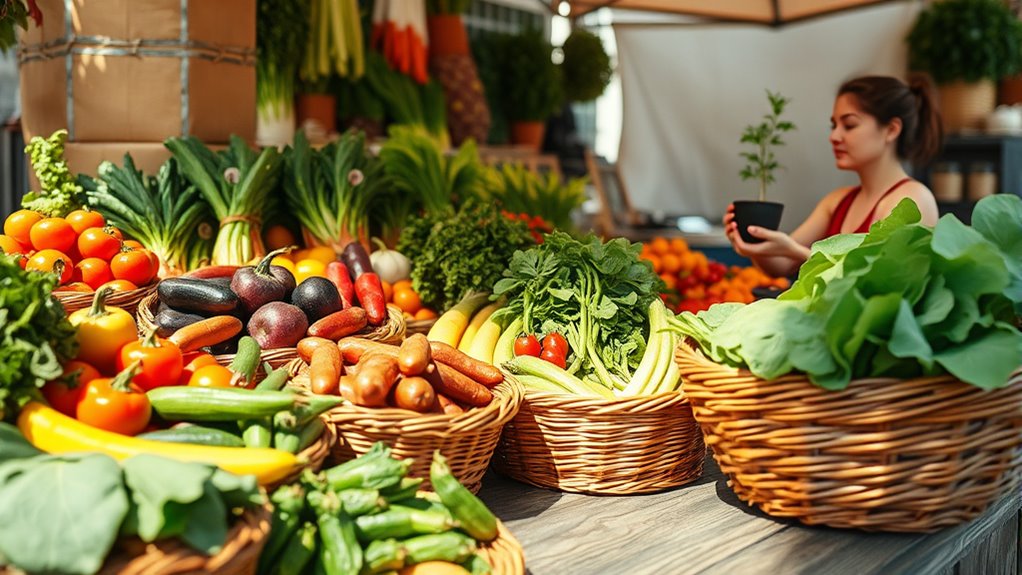Balancing mental health on a vegan journey means taking care of your nutrition and social connections. Make sure you get enough essential nutrients like vitamin B12, iron, and omega-3s through fortified foods or supplements, and monitor your diet regularly. Stay connected with supportive communities, share experiences, and find ways to enjoy social gatherings. Prioritize self-care and seek out resources that help you maintain both physical and emotional well-being—if you continue exploring, you’ll discover more ways to thrive.
Key Takeaways
- Ensure adequate intake of essential nutrients like vitamin B12, iron, omega-3s, and zinc through diet or supplements.
- Build supportive connections with vegan communities to foster understanding and emotional resilience.
- Incorporate self-care practices and monitor mental health regularly to address challenges proactively.
- Balance social interactions by communicating openly about your lifestyle and seeking understanding during gatherings.
- Use resources like performance kits and stay informed about nutrition to prevent deficiencies and maintain energy levels.

Maintaining mental health requires ongoing effort, especially in today’s fast-paced world where stress and demands often overwhelm. If you’re on a vegan journey, it’s essential to recognize how your dietary choices can impact your mental well-being. One common challenge is avoiding nutritional deficiencies that can subtly erode your mood and energy levels. Without careful planning, you might miss out on vital nutrients like vitamin B12, iron, omega-3 fatty acids, and zinc, which are crucial for brain health and emotional stability. A deficiency in these nutrients doesn’t just affect your physical health; it can also lead to feelings of fatigue, irritability, and difficulty concentrating. Ensuring a balanced intake through fortified foods, supplements, or diverse plant-based sources helps support your mental resilience and keeps your mood steady. Some specialized supplements and performance kits tailored for plant-based diets can further optimize your nutrient intake and overall well-being.
Beyond nutrition, social isolation is another factor that can threaten your mental health as a vegan. You might find yourself feeling disconnected if your social circle doesn’t share or understand your lifestyle choices. Attending social gatherings, family dinners, or even casual meetups can become stressful if you’re worried about finding suitable food options or being judged. Over time, this sense of social isolation can lead to loneliness and a decline in your mental well-being. To counteract this, seek out community groups, online forums, or local meetups focused on veganism. Building connections with others who share your values provides emotional support, reduces feelings of loneliness, and reinforces your sense of belonging. Sharing recipes, experiences, and challenges with like-minded individuals can boost your confidence and help you stay motivated on your journey.
Balancing your mental health as a vegan isn’t just about what you eat; it’s about creating a holistic approach that nurtures your body, mind, and social connections. Regularly monitoring your nutritional intake ensures you’re not unknowingly compromising your mental health through deficiencies. Meanwhile, cultivating a supportive social environment helps combat feelings of isolation that can creep in when you’re navigating a plant-based lifestyle. Remember, mental health isn’t static—it requires attention and adjustments as your needs evolve. Prioritize self-care, stay informed about nutrition, and foster meaningful relationships to maintain your mental clarity and emotional stability on your vegan journey. By addressing both dietary and social factors, you’re setting yourself up for long-term well-being and fulfillment. Incorporating performance kits designed for vegan nutrition can help fill some gaps and support your mental resilience effectively.
Frequently Asked Questions
How Can Vegans Maintain Emotional Stability During Social Gatherings?
To maintain emotional stability during social gatherings, focus on building emotional resilience and confidently communicating your choices. Stay prepared with vegan-friendly options and politely handle questions about your diet. Remember, social acceptance varies, but staying true to your values helps you feel secure. Engage with supportive friends, practice mindfulness, and remind yourself that your well-being is key. These steps empower you to enjoy gatherings without compromising your mental health.
What Are Signs of Nutrient Deficiencies Affecting Mental Health on a Vegan Diet?
You might notice signs of nutrient deficiencies affecting your mental health, like fatigue, irritability, or difficulty concentrating. Vitamin B12 deficiency can cause mood swings and cognitive issues, while iron deficiency may lead to weakness and depression. Pay attention to these symptoms, and make sure you’re getting enough through fortified foods or supplements. Regular blood tests can help you catch deficiencies early and maintain both your mental well-being and vegan lifestyle.
How Do I Handle Judgment or Criticism About My Vegan Lifestyle?
When facing judgment or criticism about your vegan lifestyle, stay confident and calm. You can practice vegan activism by sharing your reasons and experiences positively, which helps educate others. Remember, dietary flexibility is key—you don’t have to be perfect. Respond kindly, set boundaries if needed, and focus on your personal journey. Emphasizing understanding and respect can turn these moments into opportunities for meaningful conversations.
Are There Specific Vegan Foods That Boost Mental Clarity and Mood?
You might think only fancy supplements boost your mood, but some vegan superfoods do the trick naturally. Incorporate chia seeds, walnuts, and dark leafy greens for mental clarity. Berries and turmeric also help reduce stress. Don’t overlook mood-boosting supplements like omega-3s derived from algae or vitamin B12. These foods and supplements support your mental health, proving that simple, plant-based options can be powerful allies in your journey.
How Can I Prevent Feelings of Isolation as a Vegan?
To prevent feelings of isolation as a vegan, you should seek community support and engage in social activities with others who share your lifestyle. Join vegan groups or online forums, attend local meetups, or participate in vegan cooking classes. Connecting with like-minded people helps you feel understood and motivated. Sharing experiences and recipes fosters friendship, making your vegan journey more enjoyable and less lonely.
Conclusion
As you pursue a vegan lifestyle, remember that maintaining mental health is just as important as your physical health. Did you know that vegans report lower levels of stress and anxiety? Yet, it’s easy to overlook emotional well-being amidst new dietary changes. Stay mindful, seek support when needed, and prioritize self-care. Balancing mental health guarantees your journey remains sustainable and fulfilling, helping you thrive both inside and out. Your well-being is the key to lasting success.









